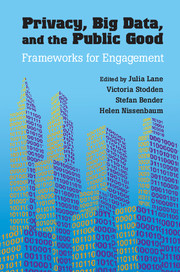Book contents
- Frontmatter
- Dedication
- Contents
- Contributors
- Editors’ Introduction
- Part I Conceptual Framework
- 1 Monitoring, Datafication, and Consent: Legal Approaches to Privacy in the Big Data Context
- 2 Big Data’s End Run around Anonymity and Consent
- 3 The Economics and Behavioral Economics of Privacy
- 4 Changing the Rules: General Principles for Data Use and Analysis
- 5 Enabling Reproducibility in Big Data Research: Balancing Confidentiality and Scientific Transparency
- Part II Practical Framework
- Part III Statistical Framework
- References
1 - Monitoring, Datafication, and Consent: Legal Approaches to Privacy in the Big Data Context
Published online by Cambridge University Press: 05 July 2014
- Frontmatter
- Dedication
- Contents
- Contributors
- Editors’ Introduction
- Part I Conceptual Framework
- 1 Monitoring, Datafication, and Consent: Legal Approaches to Privacy in the Big Data Context
- 2 Big Data’s End Run around Anonymity and Consent
- 3 The Economics and Behavioral Economics of Privacy
- 4 Changing the Rules: General Principles for Data Use and Analysis
- 5 Enabling Reproducibility in Big Data Research: Balancing Confidentiality and Scientific Transparency
- Part II Practical Framework
- Part III Statistical Framework
- References
Summary
Introduction
Knowledge is power. ‘Big data’ has great potential to benefit society. At the same time, its availability creates significant potential for mistaken, misguided, or malevolent uses of personal information. The conundrum for law is to provide space for big data to fulfill its potential for societal benefit, while protecting citizens adequately from related individual and social harms. Current privacy law evolved to address different concerns and must be adapted to confront big data’s challenges. This chapter addresses only one aspect of privacy law: the regulation of private sector acquisition, aggregation, and transfer of personal information. It provides an overview and taxonomy of current law, highlighting the mismatch between current law and the big data context, with the goal of informing the debate about how to bring big data practice and privacy regulation into optimal harmony.
Part I briefly describes how privacy regulation in the United States has evolved in response to a changing technological and social milieu. Part II introduces a taxonomy of privacy laws relating to data acquisition, based on the following features: (1) whether the law provides a rule- or a fact-based standard; (2) whether the law is substantive or procedural, in a sense defined below; and (3) which mode(s) of data acquisition are covered by the law. It also argues that the recording, aggregation, and organization of information into a form that can be used for data mining, here dubbed ‘datafication’, has distinct privacy implications that often go unrecognized by current law. Part III provides a selective overview of relevant privacy laws in light of that taxonomy. Section A discusses the most standards-like legal regimes, such as the privacy torts, for which determining liability generally involves a fact-specific analysis of the behavior of both data subjects and those who acquire or transfer the data (‘data handlers’). Section B discusses the Federal Trade Commission’s (FTC’s) ‘unfair and deceptive trade practices’ standard, which depends on a fact-specific inquiry into the behavior of data handlers, but makes general assumptions about data subjects.
- Type
- Chapter
- Information
- Privacy, Big Data, and the Public GoodFrameworks for Engagement, pp. 5 - 43Publisher: Cambridge University PressPrint publication year: 2014
References
- 18
- Cited by



